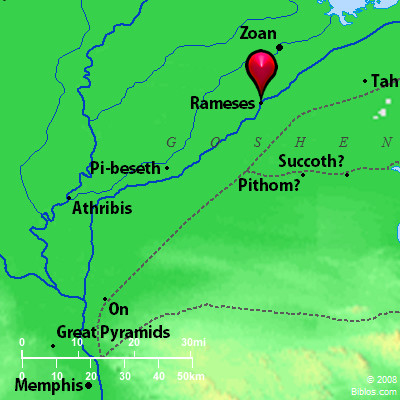Atlas  Rameses and surrounding area Maps Created using Biblemapper 3.0 Additional data from OpenBible.info You are free to use up to 50 Biblos coprighted maps (small or large) for your website or presentation. Please credit Biblos.com. Occurrences Genesis 47:11 Joseph placed his father and his brothers, and gave them a possession in the land of Egypt, in the best of the land, in the land of Rameses, as Pharaoh had commanded.Genesis 47:13 There was no bread in all the land; for the famine was very severe, so that the land of Egypt and the land of Canaan fainted by reason of the famine. Genesis 47:14 Joseph gathered up all the money that was found in the land of Egypt, and in the land of Canaan, for the grain which they bought: and Joseph brought the money into Pharaoh's house. Genesis 47:15 When the money was all spent in the land of Egypt, and in the land of Canaan, all the Egyptians came to Joseph, and said, "Give us bread, for why should we die in your presence? For our money fails." Genesis 47:20 So Joseph bought all the land of Egypt for Pharaoh, for the Egyptians sold every man his field, because the famine was severe on them, and the land became Pharaoh's. Genesis 47:21 As for the people, he moved them to the cities from one end of the border of Egypt even to the other end of it. Genesis 47:26 Joseph made it a statute concerning the land of Egypt to this day, that Pharaoh should have the fifth. Only the land of the priests alone didn't become Pharaoh's. Genesis 47:27 Israel lived in the land of Egypt, in the land of Goshen; and they got themselves possessions therein, and were fruitful, and multiplied exceedingly. Genesis 47:28 Jacob lived in the land of Egypt seventeen years. So the days of Jacob, the years of his life, were one hundred forty-seven years. Genesis 47:29 The time drew near that Israel must die, and he called his son Joseph, and said to him, "If now I have found favor in your sight, please put your hand under my thigh, and deal kindly and truly with me. Please don't bury me in Egypt, Genesis 47:30 but when I sleep with my fathers, you shall carry me out of Egypt, and bury me in their burying place." He said, "I will do as you have said." Genesis 48:3 Jacob said to Joseph, "God Almighty appeared to me at Luz in the land of Canaan, and blessed me, Genesis 48:5 Now your two sons, who were born to you in the land of Egypt before I came to you into Egypt, are mine; Ephraim and Manasseh, even as Reuben and Simeon, will be mine. Genesis 48:7 As for me, when I came from Paddan, Rachel died by me in the land of Canaan in the way, when there was still some distance to come to Ephrath, and I buried her there in the way to Ephrath (the same is Bethlehem)." Genesis 49:13 "Zebulun will dwell at the haven of the sea. He will be for a haven of ships. His border will be on Sidon. Genesis 49:30 in the cave that is in the field of Machpelah, which is before Mamre, in the land of Canaan, which Abraham bought with the field from Ephron the Hittite as a burial place. Exodus 12:37 The children of Israel traveled from Rameses to Succoth, about six hundred thousand on foot who were men, besides children. Exodus 12:38 A mixed multitude went up also with them, with flocks, herds, and even very much livestock. Numbers 33:3 They traveled from Rameses in the first month, on the fifteenth day of the first month; on the next day after the Passover the children of Israel went out with a high hand in the sight of all the Egyptians, Numbers 33:5 The children of Israel traveled from Rameses, and encamped in Succoth. Encyclopedia RAAMSES; RAMESESra-am'-sez, ram'-e-sez (Exodus 1:11), (Genesis 47:11 Exodus 12:37 Numbers 33:3, 5) (ra`mecec, ra`amcec; Rhamesse; Egyptian Ra-messu, "Ra created him" (or "it")): RAAM'SES or Rameses (pron. ray-am'seez, or ra-mee'seez), the site is not certainly known, but it was probably both a city and a district, Gen. 47:11, Exod. 1:11. Some think that San, or Tanis, was the site, as on map No. 4. Strong's Hebrew H7486: Raamses or Ramesesa city in Egypt |



